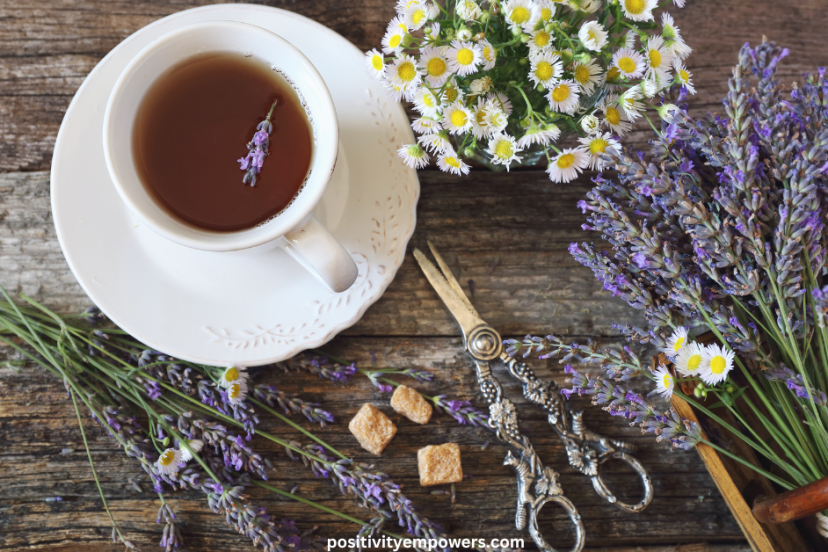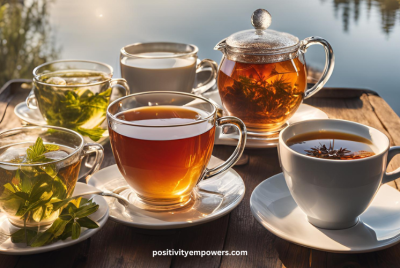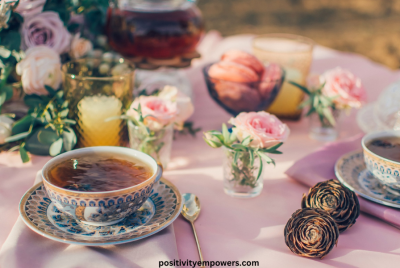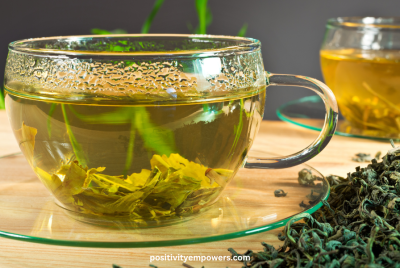Lavender Tea – A Natural Remedy for Stress, Skin, and Sleep
What Makes Lavender Tea So Special?
Lavender tea is an herbal caffeine free infusion made from dried lavender flowers. It’s like a warm hug in a cup—a natural stress-buster with a fragrant, floral flavor. Its calming properties make it the go-to drink when you’re feeling frazzled or need a moment of peace.
Whether you drink it pure or blended with other herbs, this herbal tea is a sensory delight that doubles as a wellness booster. From aiding sleep to soothing digestion, it’s packed with benefits. Whether you prefer bagged tea for convenience or loose-leaf for its aromatic richness, it has something for everyone. Let’s dive into the world of lavender tea, its types, origins, and why it’s a must-have for your pantry!
History and Origins
Lavender tea has roots in ancient healing traditions, particularly in Mediterranean cultures where lavender grows abundantly. Historically, it was used for relaxation, respiratory issues, and as a cure-all for stress. Today, its popularity has spread worldwide, with lavender farms in France and Bulgaria leading the way in producing high-quality varieties. French lavender is prized for its sweet, floral aroma, while Bulgarian lavender is known for its deeper, earthier notes. The origin can influence the tea’s flavor and aroma, so it’s worth trying varieties from different regions
Types of Lavender Tea
The process starts with harvesting lavender flowers at their peak bloom. The flowers are then dried and either left whole for loose-leaf tea or ground and packed into tea bags. High-quality varieties maintains the flower’s natural oils, which give it its signature aroma and flavor.
This herbal tea comes in various forms, each with its own appeal. The most common types include bagged, loose-leaf, organic, and blended teas. Choosing the right type depends on your taste, lifestyle, and brewing preferences.
Bagged vs. Loose-Leaf
- Lavender Tea Bags: Ideal for convenience, bagged tea is pre-measured and mess-free. Perfect for quick brewing, but it may lack the freshness and aroma of loose-leaf tea.
- Loose-Leaf Lavender Tea: Loose-leaf tea offers a more robust flavor and aromatic experience. While it requires more effort to brew, it’s the best option for tea connoisseurs who enjoy experimenting with steeping techniques.
Organic
Organic lavender tea is free from pesticides and chemicals, making it a healthier choice. It also tends to have a richer, more authentic flavor. Look for certifications like USDA Organic or EU Organic to ensure quality.
Blends
Lavender tea is often blended with other herbs like chamomile, mint, or lemon balm to enhance its benefits. For example, chamomile-lavender blends are perfect for promoting sleep, while mint-lavender teas are refreshing and aid digestion.
Health Benefits Of Lavender Tea
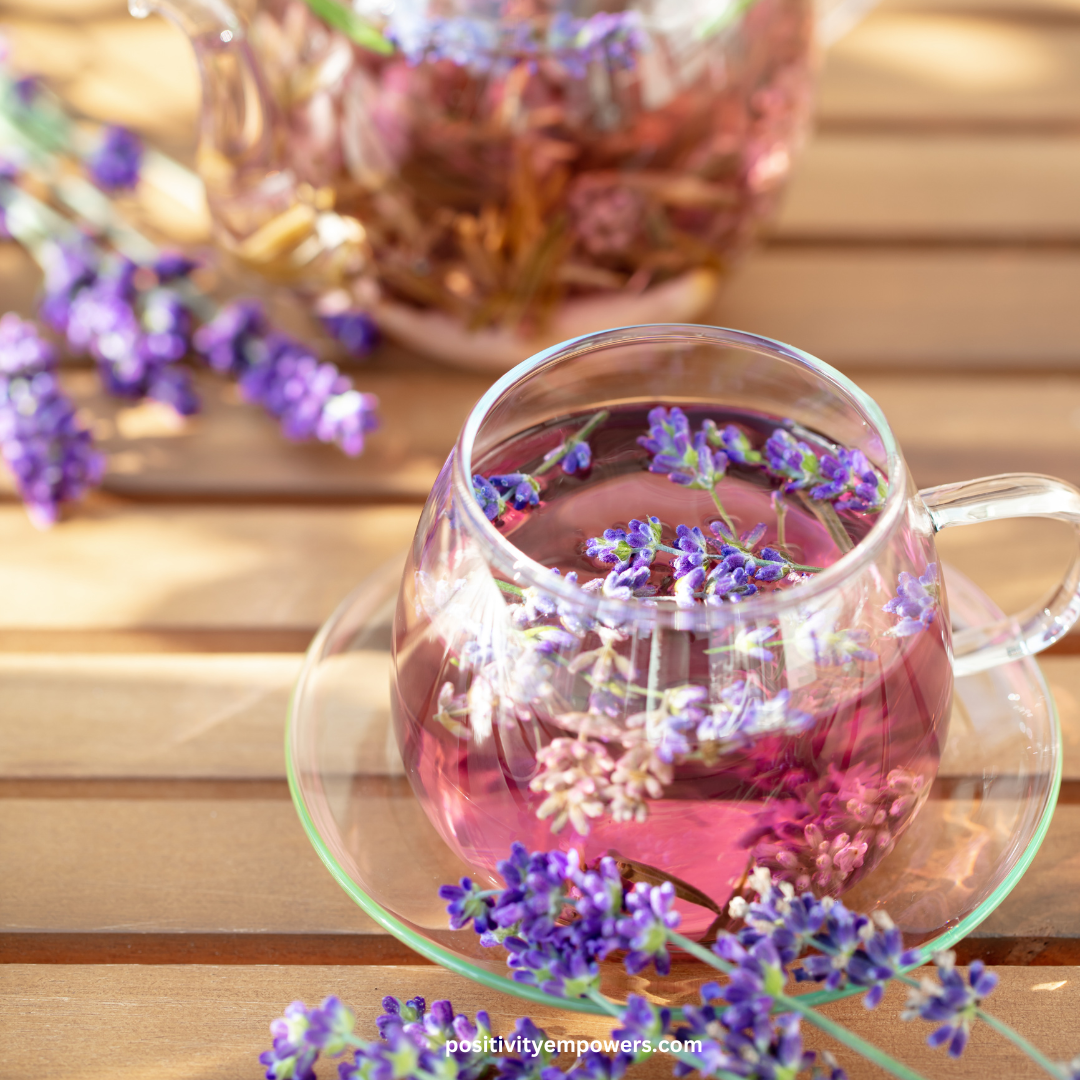
1. Relieves Stress and Anxiety
One of the most well-known benefits of lavender tea is its ability to soothe frazzled nerves. The natural compounds in lavender, like linalool, work wonders to reduce cortisol levels, which are your body’s stress hormones. A warm cup of lavender tea can feel like a comforting hug after a long, tough day.
2. Promotes Restful Sleep
Struggling with restless nights? Lavender tea is like nature’s lullaby. Its gentle sedative properties help calm your mind and prepare your body for deep, uninterrupted sleep. Sip on a cup about 30 minutes before bedtime, and let its magic work.
3. Eases Digestive Discomfort
A lifesaver when it comes to digestive woes. It can alleviate bloating, cramps, and indigestion, thanks to its ability to relax your gastrointestinal muscles. Plus, it’s gentle on your stomach, making it a go-to for those with sensitive tummies.
4. Boosts Your Immune System
Packed with antioxidants, it helps your body fight off free radicals that can weaken your immune system. Regular consumption may keep those pesky colds and flu at bay, ensuring you feel your best year-round.
5. Supports Heart Health
Lavender tea’s calming effects extend to your heart. By reducing stress and improving circulation, it can help regulate blood pressure and promote cardiovascular wellness. Add it to your daily routine for a heart-friendly habit you’ll love.
6. Reduces Inflammation and Pain
Sipping lavender tea is like a gentle massage for your body. Its anti-inflammatory properties can ease headaches, muscle aches, and joint pain. Whether you’re dealing with menstrual cramps or sore muscles from a workout, this herbal tea is a natural remedy you’ll appreciate.
7. Enhances Respiratory Health
Feeling a little under the weather? It’s soothing properties extend to your respiratory system. It can help clear nasal congestion, ease a sore throat, and calm coughing fits, making it a comforting choice during cold and allergy seasons.
8. Helps Balance Hormones
Lavender tea may also aid in balancing hormones, especially for women. It’s believed to support hormonal equilibrium during menstrual cycles and menopause, reducing symptoms like mood swings and discomfort.
With its wide-ranging benefits, lavender tea isn’t just a beverage; it’s a wellness ritual. Whether you’re looking to relax, heal, or simply enjoy a moment of peace, lavender tea is your perfect companion.
9. Skin, Hair, and Nail Benefits:
Lavender tea’s antioxidants combat free radicals, promoting clear, radiant skin and reducing signs of aging. It also supports scalp health, encouraging hair growth and shine. For nails, its anti-inflammatory effects strengthen them and prevent brittleness. Drinking it regularly is like giving your beauty routine a natural boost!
How to Make Lavender Tea
Brewing it is simple:
- Tea Bags: Steep one tea bag in hot water (about 200°F) for 5–7 minutes.
- Loose-Leaf Tea: Use one teaspoon of lavender per cup, steeped in hot water for 5–7 minutes.
- Blends: Adjust steeping time based on the additional herbs in the blend.
For an extra kick, add honey or lemon to enhance the flavor. - Cold brew: Steep it in cold water for 2–4 hours for a refreshing iced tea.
Price Ranges for Lavender Tea
- Bagged Tea: $5–$15 for 20–30 bags.
- Loose-Leaf Tea: $10–$30 per 4 ounces.
- Organic Options: $15–$40 depending on certifications and origin. Premium blends may cost more.
Buying Tips
- Origin: Look for tea from reputable regions like France or Bulgaria.
- Format: Choose between bagged for convenience or loose-leaf for flavor.
- Organic Certification: Prioritize organic options for the best quality.
- Blends: Experiment with blends to find your favorite combination.
Lavender Tea and Aromatherapy
This type of tea offers more than just taste—it ties into aromatherapy’s calming effects. Sipping it while inhaling its aroma creates a full sensory experience that enhances relaxation.
Conclusion
Lavender tea is more than a drink—it’s a ritual of self-care and wellness. With its variety of forms, incredible benefits, and soothing properties, it’s a must-try for anyone seeking relaxation and health in a cup. Whether you’re new to herbal teas or a seasoned enthusiast, it is definitely worth exploring.

